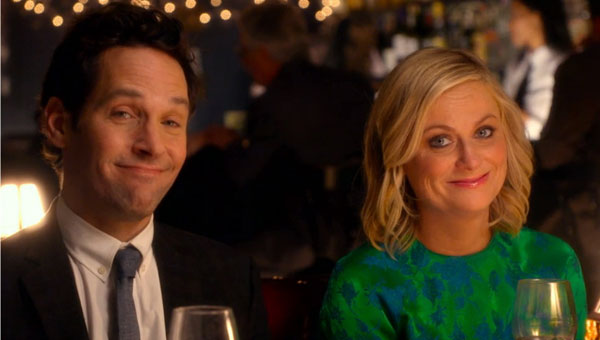They Came Together Review

Nobody who goes to see a rom-com starring Paul Rudd expects a masterpiece.
Nor, I’d speculate, do they expect to want to tear off their own flesh afterwards.
I was surprised, therefore, when I found myself so pained – nay, tortured – by cringe-worthy attempts at deadpan humour and failed satire that I was actually clawing at my face and crawling up my seat out of some kind of subconscious reflex to try and distract myself from what was on the screen before me.
David Wain and Michael Showalter’s They Came Together, it turns out, is not in fact a rom-com, but a pastiche romance.
Or at least, it tries to be.
The narrative is presented in the format of a story being relayed by the two protagonists to their unsuspecting friends at the dinner table, who, on several occasions, try to get away.
These were the only moments in the film where I felt I could relate to the characters.
Joel, played by Rudd, and Molly, played by Amy Poehler, joke that the story of how they met is the stuff of cheesy movies.
He’s attractive – but not threateningly so, and Jewish – but not too Jewish. Whatever that means.
She’s happy-go-lucky and oh-so-clumsy.
Queue a sequence of Molly tripping over various objects in her bedroom oh-so-clumsily and eventually becoming entombed by a stack of boxes which explode from her oh-so-clumsy wardrobe, before looking at the
camera with an expression which says ‘Yup, that’s me! I’m oh-so-clumsy!’
Already feeling skeptical by this point, I thought that there may nonetheless be potential for this bizarrely hyperbolic and self-aware pastiche set-up to go somewhere interesting.
But alas.
For the entire duration of the film, we are bombarded not only with caricatures of stereotypical cheesy romance plot, dialogue and characters, but entirely unsubtle ones.
And – just in case the audience hadn’t quite got that it was meant to be satirical – we are told so at each turn.
At one point, Joel walks into a bar after an episode of heartbreak. The bartender comments that he looks to be having a rough night, to which he responds, ‘Tell me about it.’
‘Well you came in here looking like crap and you haven’t said very much,’ explains Bar Tender.
‘Tell me about it,’ repeats Rudd.
‘Well you came in here looking like crap and you haven’t said very much,’ explains Bar Tender.
‘Tell me about it.’
And so the cycle continues. Not two or three times. Not four or five.
No.
For a solid minute.
Cue face-clawing and seat-crawling.
It’s not like the film has any saving graces in technical terms either.
Comedy is not a genre which tends to make bold or groundbreaking use of cinematography, score or mise-en-scène to convey stories in subtle or nuanced ways.
Rather, it relies heavily on witty dialogue and comic talent on the part of its actors.
They Came Together utterly fails on both of these fronts.
This threw me somewhat, because although the cast are by no means comedy genii, there is definitely talent amongst them.
Everybody who has seen Forgetting Sarah Marshall loves to quote Rudd’s stoner, beach-bum character Kunu.
And sizeable roles are occupied by How I Met Your Mother’s Cobie Smulders – a.k.a Robyn Sherbatsky – and Max Greenfield, the affable douchebag Schmidt from New Girl.
So how did this film turn out to be so unutterably unbearable?
I can only assume that the fault lies in the script and the direction, so in future will be sure to steer well clear of anything associated with Wain or Showalter in order to spare my face the clawmarks.
Stephanie Josine